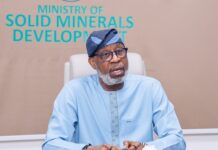Nigeria says ECOWAS studying ramifications of Morocco membership

The Economic Community of West African States is studying the implications of admitting Morocco following its request last month to join the organisation, Nigeria’s Foreign Affairs Minister Geoffrey Onyeama said.
Morocco’s request was accepted “in principle” by leaders of the group known as Ecowas at a June 4 summit in the Liberian capital, Monrovia.
“The principle, of course, is one of non-hostility to Morocco,” Onyeama said in an interview in the Nigerian capital, Abuja, on July 20. “There’s no enmity there that would mean an immediate and automatic negative response to such a request. What has to be looked at a bit more is all the technical ramifications.”
Still, Nigeria didn’t send a high-level delegation to the Ecowas summit after it emerged that Morocco would present its request to join the 15-member bloc. “We would’ve preferred to have had the opportunity to discuss internally and this was not given by the Ecowas secretariat,” Onyeama said.
Several Nigerian lobby groups, including an organisation of retired ambassadors, are putting pressure on the Nigerian government to reject the application because of the decades-old dispute over Western Sahara and Morocco’s geographical distance. Nigeria recognises the Western Sahara as an independent nation, while Morocco claims it as part of its territory.
‘Economic Diplomacy’
Onyeama, 61, served as deputy director-general of the World Intellectual Property Organization before his appointment as foreign affairs minister in 2015. He sees “economic diplomacy” as part of his role as Nigeria struggles to wean itself off its dependence on crude, he said. The country went through its worst economic contraction in a quarter of a century last year as a plunge in the price and output of its main export took a toll.
Africa is “the centrepiece” of Nigerian foreign policy under President Muhammadu Buhari, Onyeama said, citing Nigeria’s role in a military intervention in Gambia this year, its involvement in peace missions in Darfur, Somalia and South Sudan, and its support for the establishment of a rapid deployment force for the continent.
Nigeria is against African nations leaving the International Criminal Court because the continent has “no mechanism for holding leaders to account,” he said. South Africa and Burundi announced plans last year to leave the court because it has mainly brought African leaders to trial. South Africa revoked its decision this year following a local ruling that declared the proposed pullout unconstitutional.
Relations with South Africa are particularly important to Nigeria for driving Africa’s development, which is why they both have a “bi-national commission” represented at the presidential level, according to Onyeama. It was useful in resolving issues around Nigerians affected by xenophobic attacks in South Africa and there’s a joint-monitoring mechanism now in place to track developments, he said. The Guardian NG















